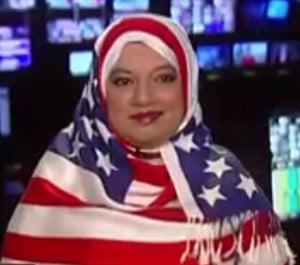This post is written by Guest Contributor, Sarabi N. Eventide (@SarabiNEventide).
By the grace of God, I have been afforded the opportunity to study in Paris next semester. I’ve been longing to go to France since I was a little girl; I spent many a day pretending I was born in the campagne (countryside) or by the rivière (river). In high school I always made sure I completed my French homework, if nothing else. Now, in university, I force myself to get up and get dressed in time to make it to my 8 AM French conversation and composition course, even though it’s unfathomable that a third-year student would intentionally select classes at such a dreadfully early hour. Yet, I do it, because going to France has been my plan since long before I even knew what Islam is.
I’m finally going to France in the spring, insha’Allah, and I am terrified. My apprehension has nothing to do with planes or relocation; I’ve long been accustomed to packing up and moving across the world. Rather, I’m intimidated by France’s blatant disrespect towards and disregard for religious people, Muslims in particular. It’s no secret that France’s policy against religious dress and other conspicuous displays of religion disproportionately affects Muslim women. France’s quest for a strict separation of church and state in the public sphere while protecting private beliefs, confounds the two arenas by allowing the codification of laws that inhibit the open practice of faith. Each legislative push against religion brings it closer to the heart of the public sphere and encroaches upon the private. While it is understandable that France would like to keep its citizens safe by banning clothing that might inhibit criminal investigations, instances of attacks by veiled women are relatively rare and do not characterize the whole of the Muslim population in France, especially considering France hosts one of the largest Muslim populations in Europe. These laws, then, do more to harm the highly-visible female Muslim population than to protect the public. France is trying to erase Muslim women.

As if to further the affront against human rights, the French are now dictating not only what Muslims wear, but also what they put into their bodies. New French policies regarding school meals are forcing children to go without an entrée instead of providing them with non-pork options. This policy affects not only Muslim students, but also Jewish students. Combine this with the fact that all head coverings are banned in the French school system and can apparently be banned in university and it seems like religious students are being punished for attempting to pursue an education. Private faith schools are permitted to set their own rules regarding dress and dining options, but not everyone can afford a private faith school, and those schools aren’t always the best for creating well-rounded citizens capable of navigating social situations involving people of differing cultural and economic status.
Such egregious policies cause identity problems by forcing students to choose between family, faith, and state. They cause educational problems by focusing on trivial details and distraction students who may be more than eager to learn. The policies even prevent children from having meaningful childhood experiences. Beneytou, the mayor of the small town from which the school meal controversy stems claims the decision to remove non-pork options was made “in the interests of living together” and claims serving different meals would set students apart. What he fails to realize, however, is that serving students a meal without an entrée is no different from serving meals with a different entrée. In both cases students are being served different meals. With the removal of non-pork options, students are set apart by eating incomplete meals. Classmates will notice and wonder why their peers don’t have any meat, and the children, being the ever envious human beings they are, will long to have as much food as their classmates, forcing them to decide whether the values of their religion are worth the deprivation. No one wants to be seen as “the other.” It seems that to France, forced homogeneity is the definition of secularism. Such environments fail to according to a headteacher who wished to remain anonymous.
France’s discriminatory measures against Muslims are rapidly increasing in number, prompting both protests against the policies and violent attacks against those the laws target. France is essentially codifying religious intolerance, but only towards certain religions. Let’s not forget that France has national holidays that coincide with several Christian holidays, including more obscure holidays such as Ascension and the Assumption of Mary. Yet, there is not a single holiday given to those of Jewish or Islamic faith. Hindu, Sikh, Buddhist, and Baha’i holidays are also excluded, of course.
It is unacceptable that the so-called secular policies have been allowed to progress to this point. Perhaps I’m biased with my outspoken American attitude, but there needs to be more resistance among the French. There needs to be more lobbying against the policies and boycotts against intolerant businesses. It is ridiculous that Muslims (and others who choose to wear symbols of their religion) are being denied education for something that has no effect on their performance. Even more outrageous is the infringement of adult politics on even the youngest children. Is it not enough that the children were born in France? Is it not enough that they have learned the language? Is it not enough that they can sing both the national anthem and the latest pop songs? At this rate, speech will be next action to be policed– the slightest religious utterance to a friend overheard by a stranger might be cause for arrest.











